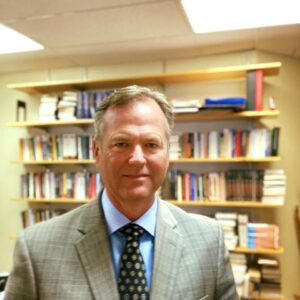Public crises drive Christian readers to make meaning with Scripture, work that requires a disciplined imagination. I propose a rhyming association between Luke’s Gospel and public debates concerning Covid-19 protocols such as masking and vaccines. Luke’s thematic depiction of self-centered indifference rhymes with contemporary arguments concerning individual freedom and mutual accountability. Debates that extend to other areas of public life. Our public conflicts resonate with aspects of Luke in revelatory ways.
Framing the Debate
Public guidance concerning the Covid-19 outbreak has shifted, resulting in predictable confusion and controversy, given the scale of the Covid threat. In just a month, widespread resistance to masking and shutdowns of schools and churches broke out all over the country. Some of the resistance sprung from the economic and social pain of lockdowns, but resistance also clustered in right-leaning Christian communities. Having gained fame for resisting Covid measures, Pennsylvania State Senator Doug Mastriano won the Republican nomination for governor with a “Walk as free people” slogan, a riff on John 8:36 (So if the Son sets you free, you will be free indeed). Antivaccination and antimasking campaigns coalesced under a banner of religious freedom.
American Christian nationalists construe freedom in a particular way. They regard freedom as the ability to do as they choose, both individually and as a movement, without regard for their impacts on others. Their definition is hardly countercultural, and it comports with prominent definitions one might encounter in the dictionary. However, it runs counter to the gospel. Consider Paul, who understood freedom as entailing an obligation to look out for one another:
“For you were called to freedom, brothers and sisters, only not freedom toward an opportunity for the flesh, but through love become enslaved to one another. (Gal. 5:13, my translation)”
Although Paul uses the troublesome metaphor of slavery, Paul interprets freedom as liberation from the social and spiritual power of sin so that persons can “bear one another’s burdens,” not as blank license (Gal 6:2).
I aim to advance this line of thinking by attending to a little-known dimension of Luke’s Gospel. Luke depicts characters who model self-centered indifference—a person can be virtuous so long as they do not actively harm someone else. They apply their agency as people who are free to do as they choose without regard for the welfare of others. They reflect the kind of freedom so valued in much of contemporary American culture, even Christian culture. In Luke’s narrative web, things do not go well for people who model self-centered indifference.
Sin as Self-Centered Indifference in Luke
Luke’s Gospel discusses sin more than the other Gospels do, and in diverse ways. Luke demonstrates an understanding of sin as involving discrete disordered behaviors, in that persons may be described as “sinners” on account of their behaviors. Repentance of sinful behavior is desirable, and forgiveness of sin constitutes a great good. But Luke’s engagement of sin extends beyond vocabulary to narrative dynamics. Luke shows particular interest in the behavior that manifests what we might call self-centered indifference. It is a pattern that occurs especially in passages unique to Luke. However, Luke never attaches the vocabulary of sin to this pattern, though repentance does come into view on one occasion (16:30).
Luke’s most obvious case of self-centered indifference involves the rich man who neglects Lazarus (16:19-31). The story involves one of Luke’s distinctive crisis parables, in which a character of relatively high status faces a dramatic reversal of fortune. As for the rich man, commentators routinely observe that he has neglected Lazarus: after all, from his vantage point in Hades, he recognizes Lazarus and requests to send him on an errand. Some readers perceive the parable as presenting Luke’s view of judgment and the afterlife; I am not so sure. The parable offers precisely one explanation for the rich man’s torment in Hades and for Lazarus’s comfort in Abraham’s bosom—one received good things on this side of death and the other bad things, and death reverses their fortunes. Accounting for the rich man’s neglect of Lazarus, the parable’s stark contrast between one man’s daily partying and the other’s persistent suffering strongly suggests a condemnation of the rich man’s self-centered indifference.
We encounter self-centered indifference in several other stories. The parable of the “rich fool” sets forth a man whose fault lies in considering only his desires rather than building treasures in heaven (12:16-21). Jesus warns Luke 6:24: “Woe to you who are rich, for you have received your consolation.”
At least two other parables feature self-centered indifference. The corrupt judge grants justice only when the widow causes him sufficient irritation to do so, not due to the merits of her complaint (18:1-8). And the Samaritan’s compassionate behavior contrasts with two other figures in the parable, who simply cross by the road to pass on by a man who is wounded and helpless (10:25-37). Even Pontius Pilate can be read in this fashion.: Pilate would free Jesus, but he instead chose to satisfy the crowd (23:22-25).
Self-centered indifference involves an abuse of freedom—harm to the survival and well-being of others. It is a kind of freedom that has motivated resistance to public health guidelines, even violent resistance, with the result that people in so-called “red” counties suffering significantly higher death rates than people in “blue” counties. Christianity is scarcely the only religion that rejects the restriction of freedom to individual license. However, it is painfully ironic that American Christians, in particular, have abused the notion of freedom to such deadly effect.

Greg Carey is a Professor of New Testament at Lancaster Theological Seminary. His most recent works are Death, the End of History, and Beyond: Eschatology in the Bible (Westminster John Knox) and Using Our Outside Voice: Public Biblical Interpretation (Fortress). A layperson in the United Church of Christ, Greg works for justice in public education and full LGBTQ+ inclusion in the life of the church. He also speaks and writes on the dangers of Christian nationalism.